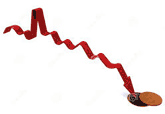| |
|
| |
|
 |
Supply
Chain by the Numbers |
| |
|
| |
- March 12, 2015 -
|
| |
|
| |
|
| |
|
| |
Value of Cargo Thefts Soar in 2014; Ashley Furniture Keeps Making it in the USA; Companies Likely to Continue to Shift Container Traffic Away from West Coast Ports; US Productivity Growth is Low |
| |
|
| |
| |
| |
$232,924 |

|
|
|
| |
| |
|
33%
|
|
That is the percent of container freight coming into the port of Los Angeles that is "purely discretionary" - meaning it could be rather easily shifted to other ports. That according to Gene Seroka, executive director of the Port of LA. In fact, "Some of that cargo has [already] moved to other port complexes. It's going to be extremely difficult to earn that business back," Seroka added. While how much cargo has been permanently shifted is not yet clear, imports fell 28% year-over-year at the port in January. The nation's biggest shippers have employed for years what is known in the industry as a" four-corner" strategy, in which they use ports at northern and southern locations on both coasts and the Gulf of Mexico, to reduce both cost and risk. Now it appears even smaller companies may decide to spread the container wealth around versus just using LA-Long Beach.
|
| |
| |
|
| |
| |
0.3% |

|
That's the slow rate of average annual growth in the US economy's total inventory of capital - equipment, software and buildings - over the past decade. That's the slowest rate of such growth in at least the past 40 years. The slow growth has two related impacts. First, it reduces GDP growth versus what it might been with more normal levels of business spending. Second, capital is key to boosting worker productivity, and slow growth in those capital resources will surely mean lower productivity growth in the future, which also will reduce economic growth. Indeed, that effect is already happening. Non-farm productivity growth has risen just 1.3% annually since 2009, far below historical standards, and shrank 2.2% annualized in the fourth quarter. Former Federal Reserve Chairman Alan Greenspan said last week that "We have zero productivity growth in the last couple of years. If you don't get productivity right, your economy is in trouble." Not good.
|
| |
| |
|
|
|
| |
 |
 |
| |
|
|
| |